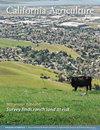通过信任恢复橡树林地:社会资本及其在成功的私人土地保护中的作用
IF 1.1
4区 农林科学
Q2 AGRICULTURE, MULTIDISCIPLINARY
引用次数: 0
摘要
正式的私人土地保护计划对于实现保护目标至关重要,特别是在具有大量私人所有权的生态系统中。加利福尼亚州洪堡县和整个太平洋西北部的大多数落叶橡树林地都位于私人土地上。由于针叶树的入侵,这些林地的流失是一个重要的保护问题,对野生动物栖息地、范围管理、文化资源、生物多样性和火灾管理都有影响。私人土地项目依赖于激励和自愿合作。通过访谈和参与观察,我们探讨了土地所有者如何以及为什么参与橡树林地恢复。我们对社会资本的作用特别感兴趣,它由信任和互惠的期望组成。我们发现,橡树林地的恢复依赖于建立社会资本,以利用不同的技能组合,获得资源和技术专长。我们认为,社会资本是私有土地保护的必要组成部分,而不是成功的副作用,建立和维护社会资本本身就可以构成保护目标。本文章由计算机程序翻译,如有差异,请以英文原文为准。
Restoring oak woodlands through trust: Social capital and its role in successful private land conservation
Formal private land conservation programs can be essential for achieving conservation goals, especially in ecosystems with substantial private ownership. Most deciduous oak woodlands in Humboldt County, California, and throughout the Pacific Northwest are located on private lands. The loss of these woodlands to conifer encroachment is a critical conservation concern, with implications for wildlife habitat, range management, cultural resources, biodiversity, and fire management. Private land programs depend on both incentives and voluntary cooperation. Through interviews and participant observation, we explored how and why landowners participate in oak woodland restoration. We are particularly interested in the role of social capital, which consists of trust and expectations of reciprocity. We found that oak woodland restoration depends on building social capital in order to leverage different skill sets and gain access to resources and technical expertise. Rather than a side effect of successful private land conservation, we assert that social capital is a necessary part of it, and that building and maintaining social capital can itself constitute a conservation goal.
求助全文
通过发布文献求助,成功后即可免费获取论文全文。
去求助
来源期刊

California Agriculture
农林科学-农业综合
CiteScore
2.40
自引率
7.70%
发文量
17
审稿时长
>12 weeks
期刊介绍:
Information not localized
 求助内容:
求助内容: 应助结果提醒方式:
应助结果提醒方式:


